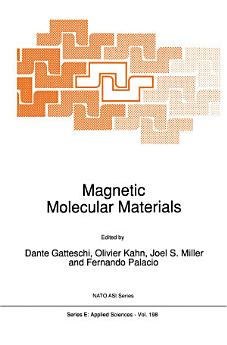Magnetic Molecular Materials
D. Gatteschi · O. Kahn · Joel S. Miller · Fernando Palacio
2012년 12월 · NATO Science Series E 198권 · Springer Science & Business Media
eBook
411
페이지
report검증되지 않은 평점과 리뷰입니다. 자세히 알아보기
eBook 정보
One of the major challenges of science in the last few years of the second millennium is learning how to design materials which can fulfill specific tasks. Ambitious as it may be, the possibilities of success are not ne~li~ble provided that all the different expertises merge to overcome the limits of eXIsting disciplines and forming new paradigms science. The NATO Advanced Research Workshop on "Magnetic Molecular Materials" was organized with the above considerations in mind in order to determine which are the most appropriate synthetic strategies, experimental techniques of investigation, and theoretical models which are needed in order to develop new classes of magnetic materials which are based on molecules rather than on metallic or ionic lattices. Why molecules? The answer may be obvious: molecular chemistry in principle fine can tune the structures and the properties of complex aggregates, and nature already provides a large number of molecular aggregates which can perform the most disparate functions. The contributions collected in this book provide a rather complete view of the current research accomplishments of magnetic molecular materials. There are several different synthetic approaches which are followed ranging from purely organic to inorganic materials. Some encouraging successes have already been achieved, even if the critical temperatures below which magnetic order is observed still are in the range requiring liquid helium.
이 eBook 평가
의견을 알려주세요.
읽기 정보
스마트폰 및 태블릿
노트북 및 컴퓨터
컴퓨터의 웹브라우저를 사용하여 Google Play에서 구매한 오디오북을 들을 수 있습니다.
eReader 및 기타 기기
Kobo eReader 등의 eBook 리더기에서 읽으려면 파일을 다운로드하여 기기로 전송해야 합니다. 지원되는 eBook 리더기로 파일을 전송하려면 고객센터에서 자세한 안내를 따르세요.







